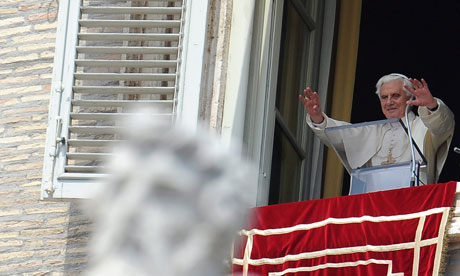By Tom Kington
The Guardian
May 16, 2011
http://www.guardian.co.uk/world/2011/may/16/vatican-sex-abuse-guidelines-criticised
 |
| Pope Benedict XVI at the Vatican. He has repeatedly apologised to child victims of clerical sex abuse. Photograph: Maurizio Brambatti/EPA |
Vatican guidelines on preventing clerical sex abuse and reporting suspect priests to the police, published on Monday, leave too much autonomy with bishops who have often been accused of covering up scandals, victims' groups said.
The Vatican issued the guidelines to bishops's conferences around the world with orders that bishops draw up their own rules by May 2012.
The circular letter, which was described by the Vatican as "very strong and eloquent," follows sex abuse revelations in the US and Europe which have prompted Pope Benedict XVI to repeatedly apologise to victims.
Over the weekend, Cardinal Angelo Bagnasco, the head of the Italian bishops' conference, spoke of the church's shame after the arrest of a priest in Liguria suspected of abusing a 16-year-old boy and giving youths cocaine.
Sent to bishops by the Vatican's congregation for the doctrine of the faith on 3 May, the circular tells bishops to be committed to the "spiritual and psychological assistance" of victims, look more closely for signs of abuse, vet seminarians more effectively and pay more attention to those who move from one seminary to another.
While the reporting of accusations to the police is not made compulsory, bishops are told to follow "the prescriptions of civil law regarding the reporting of such crimes to the designated authority."
"We are looking for universality," said Vatican spokesman Father Federico Lombardi. "Countries like the US, UK, Germany and Ireland already have similar guidelines but the idea is to push other conferences where problems have not been so pronounced."
Lombardi said that thanks to the circular, bishops in Italy could set up formal guidelines on tackling abuse for the first time.
The letter does not match American church rules under which priests are automatically suspended from duty during an investigation when there is sufficient evidence abuse has occurred. "The bishop is always able to limit the exercise of the cleric's ministry until the accusations are clarified," is as far as the letter goes.
The letter also holds that lay review boards set up to monitor the church's safeguarding of minors "cannot substitute" the decisions and powers of bishops.
"This document is dangerous because it gives the impression the church is tackling the problem whereas it is supporting the status quo," said Maeve Lewis, the executive director of Irish victims' group One in Four.
"They have allowed bishops to retain a huge discretionary power to decide if accusations are credible, just as a new report has shown the church in Ireland did not allow its own safeguarding body to review practices in 23 out of 26 dioceses."
Roberto Mirabile, the head of Italian anti-paedophilia campaign group La Caramella Buona, said the letter would not encourage bishops to seek help from lay experts. "The bishops keep the job, but so many still do not collaborate and would prefer to talk about plots against the church. What punishment will they get?"
Any original material on these pages is copyright © BishopAccountability.org 2004. Reproduce freely with attribution.